Entrepreneur Eben Bayer grew up on a small family farm in Vermont where he helped raise and kill chickens and pigs. Now, his passion for solving the world’s biggest problems has turned him toward disrupting animal agriculture, with a hyper focus on Replacing pork bacon with a vegan version made from mycelium—the fast-growing root systems of mushrooms.
Bayer is best known for his company Ecovative, which employs the magic of mycelium to create sustainable solutions to problems such as plastic packaging, leather production, and building materials. Ecovative’s products have been widely used by major clients such as IKEA. Last year, the company began working with PVH Corp.—the parent company of fashion brands Calvin Klein and Tommy Hilfiger—to replace both plastic-based vegan leather and animal-derived leather with its environmentally and animal-friendly mycelium leather.
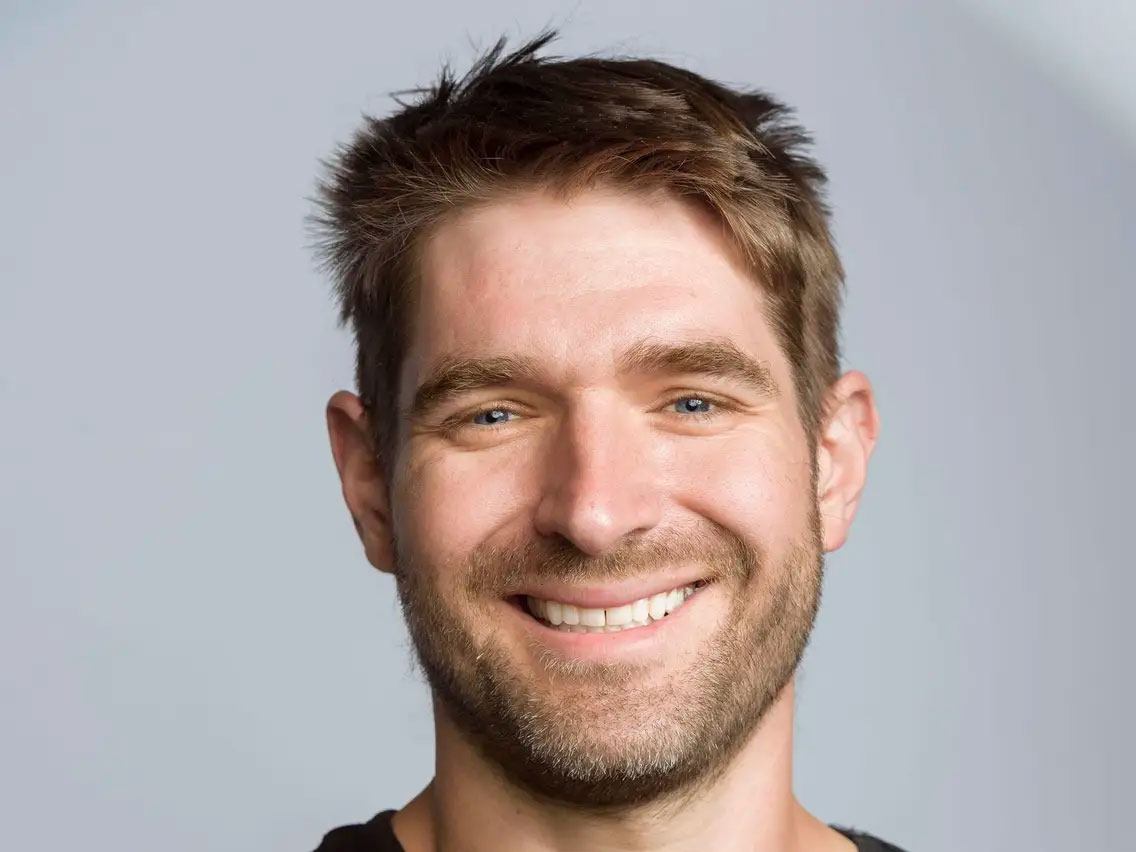 MyForest Foods
MyForest Foods
Bayer was inspired to start Ecovative during his time at Rensselaer Polytechnic Institute, where late professor Burt Swersey pushed him to identify the most pressing issues in the world and then develop technology to solve them. However, the entrepreneur’s upbringing kept him from thinking about mycelium as a solution for the environmentally destructive animal agriculture industry … until now.
“I had a blindspot around food. I moved away from eating meat completely in my own life but had this view [about] beautiful animal agriculture and how it’s not so bad,” Bayer told VegNews. “I got hit on the head twice from my friends in the sustainability community. Once about how animals are horrible for the planet when they are farmed intensively from a carbon standpoint and then twice, when I finally looked into factory farming. This was nothing like the pigs we raised in Vermont.”
These realizations pushed Bayer to expand Ecovative with a food arm, MyForest Foods, under which he launched MyBacon, a vegan bacon made from an edible mycelium strain that is grown into meaty slabs, which are brined and sliced just like pork belly.
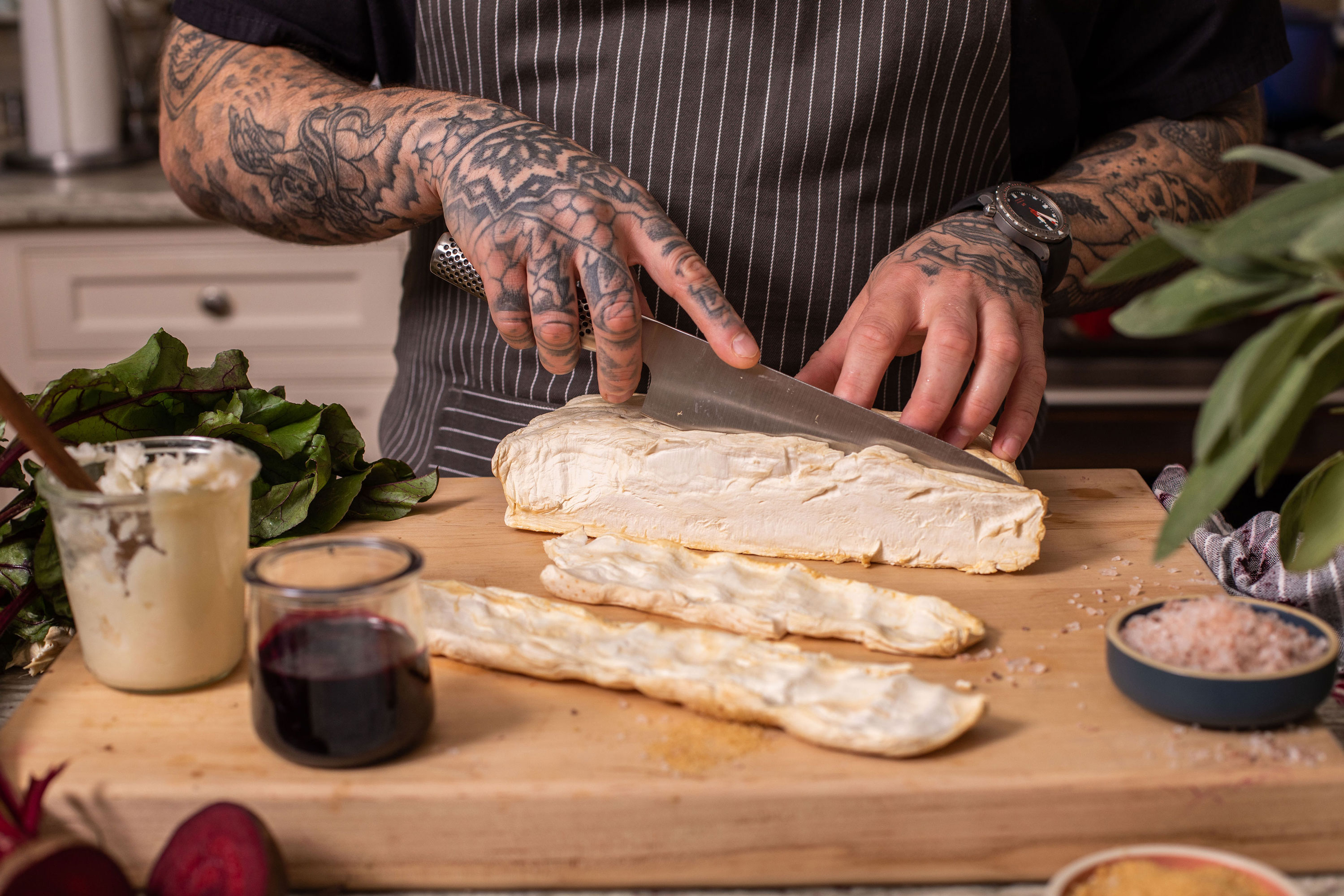 MyForest Foods
MyForest Foods
“Fully displacing animal agriculture is one of the most important things I can work on and that just happened to align with where we were on developing this mycelium,” Bayer said. “The original idea then was leather and I never thought we’d do food. The whole point of Ecovative [at the time] was everything except food but it brought me full circle back to this space and it’s a space I’m really passionate about.”
Growing vegan bacon from mushrooms
Bayer first teased the concept of making meat from mycelium at the 2018 Biofabricate Summit in New York City by showing a piece of sizzling bacon. What most didn’t know was that this piece of mycelium was not edible and was instead destined to become a mushroom leather prototype. But it sparked an idea and the next year, Ecovative did extensive business analysis around different whole-cut meats—their environmental and ethical considerations and value of producing them. The company created mycelium-powered chicken breasts, steaks, and even pasta and sampled different fungi before landing on the one it is using in MyBacon. In addition to mycelium, MyBacon is made with beet juice for color, and contains coconut oil for the unctuous, fatty element.
Ultimately, while MyForest Foods is capable of producing a wide variety of mycelium meats, Bayer chose to focus on vegan bacon to deliver maximum impact. “Bacon, interestingly, appears to be what I call a ‘trim tab’ which is the rudder on a boat that turns the boat. The idea is that it’s the point of maximum leverage,” Bayer said. “[Bacon] was a trim tab because out of all the whole-cut meats that we made in our first iteration, bacon blew it out of the water in our taste test against existing bacon, plant-based bacon, and just generally, people loved it.”
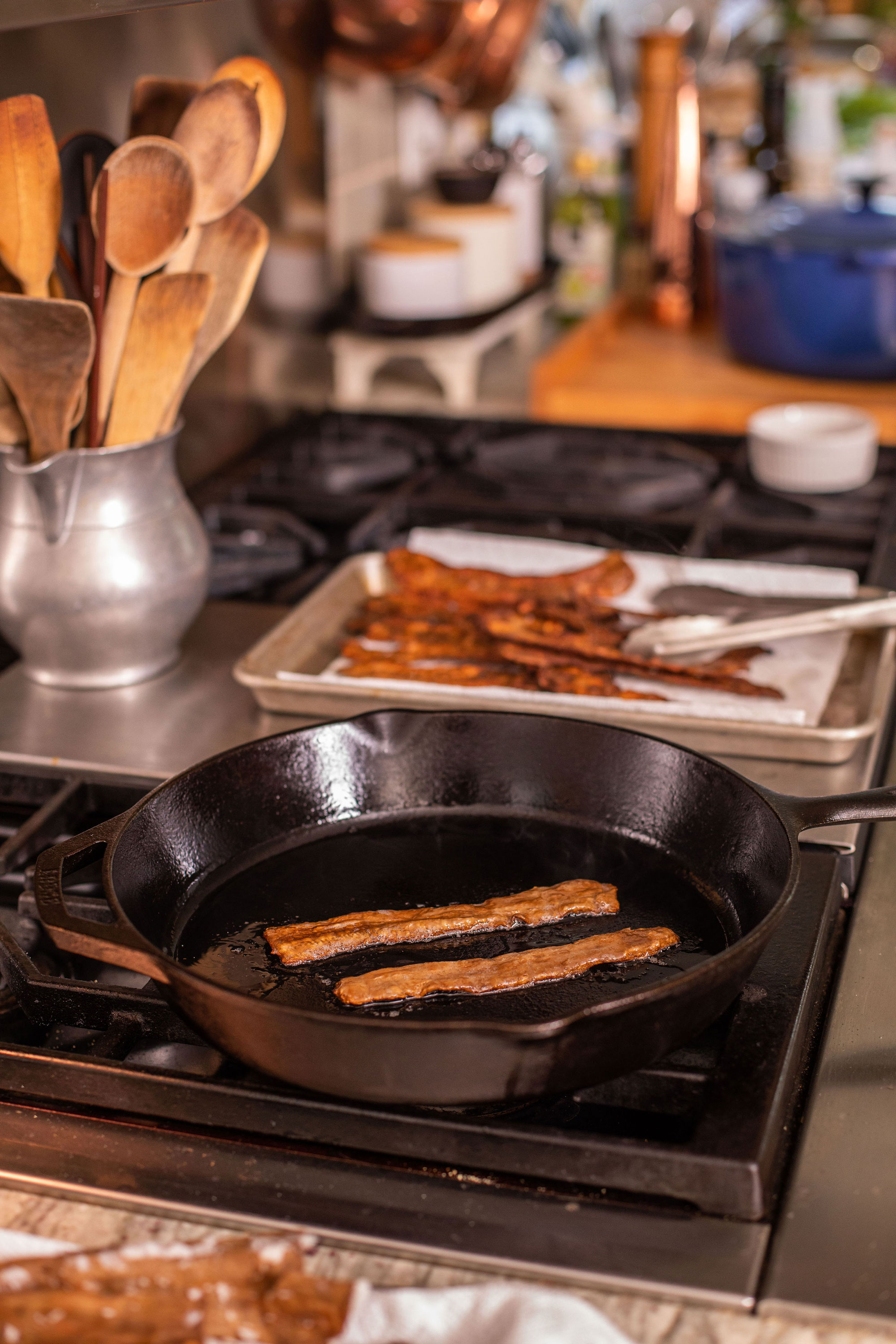 MyForest Foods
MyForest Foods
Making meatless bacon is also a profitable business and MyForest Foods raised $40 million in 2021 to support its commercialization. “It’s one of the most profitable cuts of whole meat you can sell. It’s very compact,” Bayer said. “If you’re going to drive venture money into a science program like this that’s going to have an impact, you have to have a great business case.”
By making vegan bacon that is identical to its animal counterpart in all the ways that matter, Bayer also aims to shut down the most common pushback people give for not going plant-based. “The other thing we learned is how people bring up bacon all the time as the thing that keeps them from switching away [from meat], “Bayer said. “If we can get something really great here … now you can order your Impossible and Beyond Burger with bacon on it. It felt like the point of maximum leverage.”
Bringing vegan mushroom bacon to the masses
This month, Bayer took MyForest Foods to the next level with the opening of Swersey Silos in Green Island, NY. The 120,000-square-foot vertical mycelium farm—the world’s largest farm of its kind—is dedicated to Bayer’s inspirational professor and uses the AirMycelium-patented technology developed by Ecovative to grow raw material for MyBacon. Here, MyForest Foods can produce up to nearly three million pounds of mycelium annually. Combined with a major partnership it signed this year with Canadian company Whitecrest Mushrooms, MyForest is aggressively scaling its production capabilities with the goal of serving its vegan bacon to one million customers by 2024.
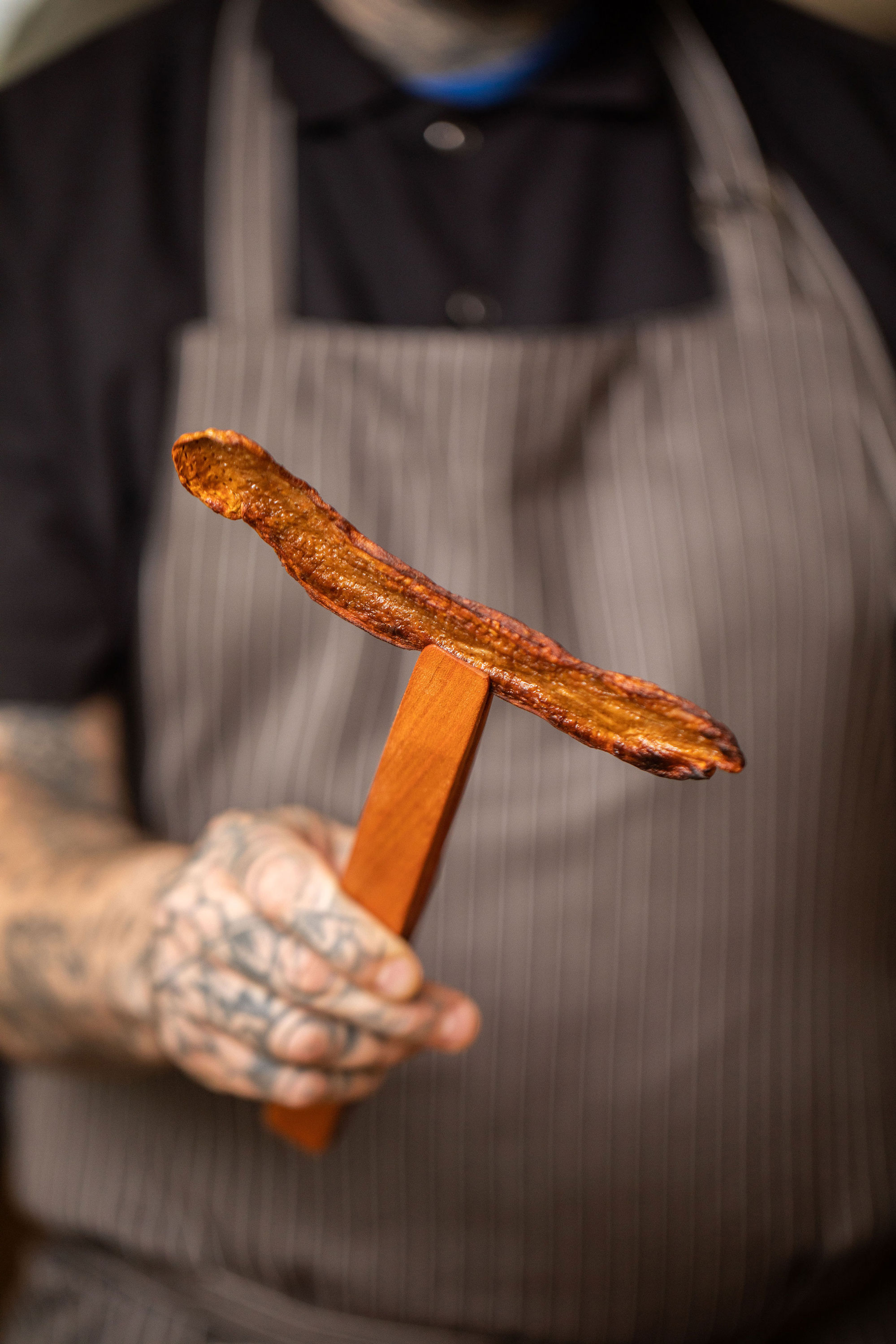 MyForest Foods
MyForest Foods
Bayer hopes that creating bacon in this way, from mycelium and not pigs, will begin to restore a harmony with the way humans interact with animals and nature. “The way humans raise pigs kind of perverts the pig. We put them in these little boxes. We feed them grains. They can’t turn around. It’s a perversion of everything that makes a pig great,” Bayer said. “Whereas putting mycelium in a big box like we do in a vertical farm and feeding it wood chips and giving it mist and air flow is absolutely what the mycelium wants. It totally is what it exists to do and is far more efficient at creating something that is pork-like.”
The next generation of bacon
While many companies look to larger retailers like Whole Foods as their first stockist, Bayer likes to get products to market as early as possible and tapped Honest Weight Food Co-Op in Albany, NY as the retail debut partner of MyBacon. At the co-op, MyForest Foods can test the vegan bacon alongside its animal counterpart at a smaller scale. And the results thus far are promising.
Despite increasing supply by a factor of three or four, Bayer says that MyBacon is “outselling the pork bacon next to us” for 70 weeks straight. This month, MyForest expanded its vegan bacon to two additional retail partners, Berkshire Food Co-op in Great Barrington, MA, and Cornucopia Natural Wellness Market in Northampton, MA, with a larger expansion planned now that new production capacity is being added.
Between Ecovative and MyForest Foods, Bayer has spent $45 million to build three separate factories which provide the infrastructure to produce $60 million worth of bacon on a raw material basis. “Over the next 18 months, we have to take that from zero to 60 and show that we can operate those in capitalism as profitable plants and that the phenomenal response we got in consumer testing and in these first retail locations can be magnified across the Eastern seaboard,” Bayer said. “That’s the next rubicon. If we do that, we’ll launch many more cuts and we’ll go to Europe and we’ll do the whole thing.”
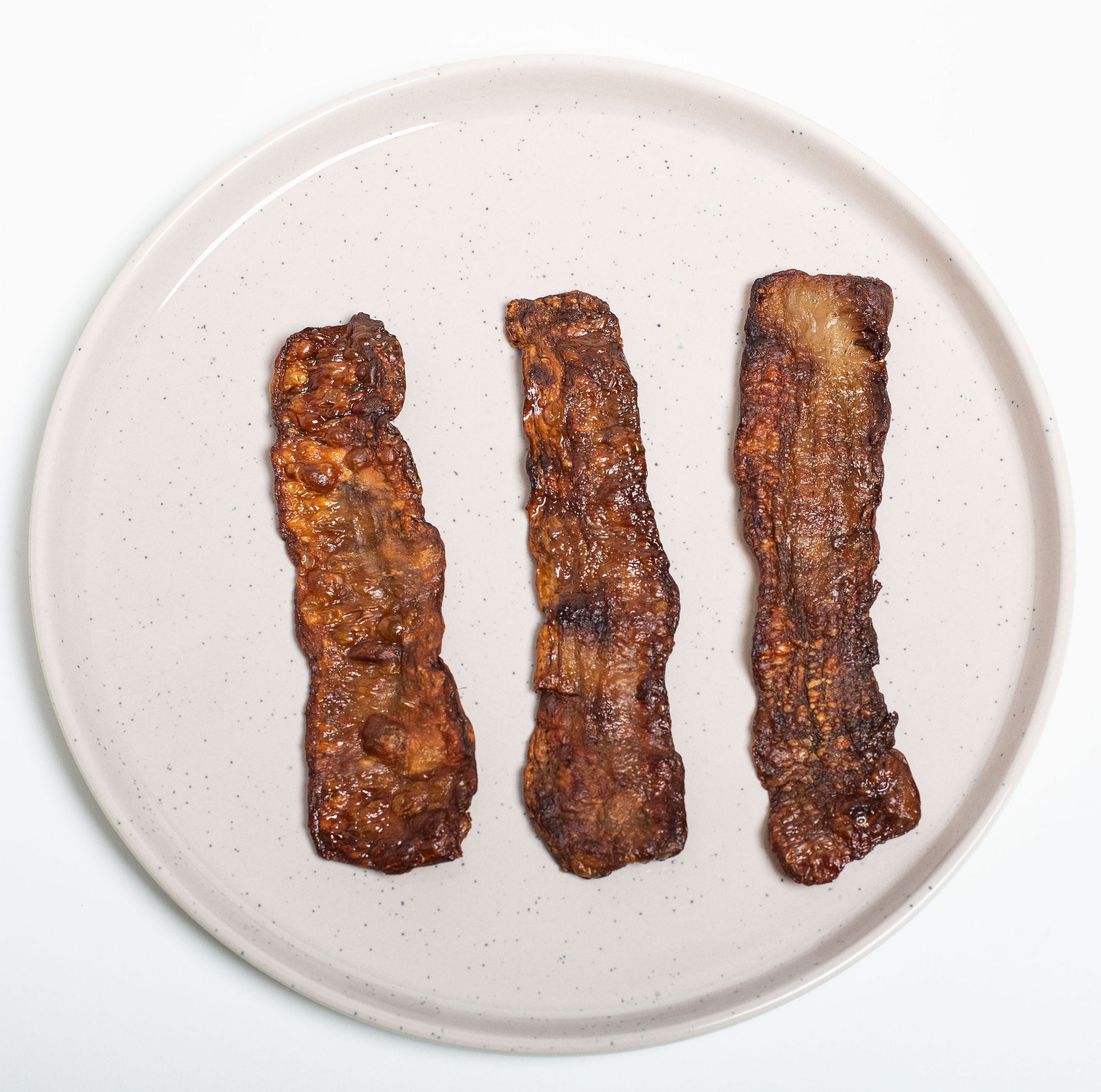 MyForest Foods
MyForest Foods
To fill in his “blindspot” around food, Bayer has assembled a team of food industry experts, including Gary Hirshberg (co-founder of yogurt giant Stonyfield Farm) and Stephen McDonnell, who founded Applegate Farms as a “better bacon” company with messaging around happy pigs. After selling it to Hormel for $775 million in 2015, McDonnell had a similar shift of perception to Bayer and is now helping MyForest Foods to commercialize its vegan bacon.
Much like the domestication of animals brought about a new era of food production, discoveries in how fungi function in meat-like ways are putting companies such as MyForest Foods at the forefront of a new era. “One of the big things that people say about why meat is so great is that it’s unprocessed,” Bayer said. “But the reality is that the mycelium magic is that it assembles the same structure you find in a steak or a piece of pork without having to use the animal and then you just slice it up, you brine it, you smoke it, you salt it up, and you fry it. That’s pretty close to what humans have been doing for 100,000 years.”
For the latest vegan news, read:
How This Vegan-Friendly Bakery Rose Above Anti-LGBTQ Hate Crimes
Brazil’s Vegan Meat Giant Takes Over LA Restaurants for 4 Weeks
Vegan Flank Steak? Get It at These 6 Restaurants
Happy birthday, VegNews! To celebrate, we’re having a mega subscription sale—complete with incredible vegan prizes.
Happy birthday, VegNews! To celebrate, we’re having a mega subscription sale—complete with incredible vegan prizes.
